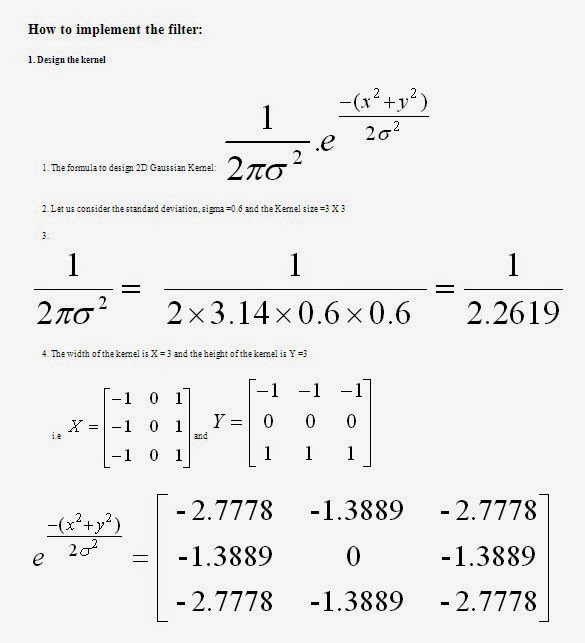Gaussian Filter
Gaussian Filter is used to blur the image. It is used to reduce the noise and the image details.
The Gaussian kernel's center part ( Here 0.4421 ) has the highest value and intensity of other pixels decrease as the distance from the center part increases.
On convolution of the local region and the Gaussian kernel gives the highest intensity value to the center part of the local region(38.4624) and the remaining pixels have less intensity as the distance from the center increases.
Sum up the result and store it in the current pixel location(Intensity = 94.9269) of the image.
MATLAB CODE:
%Gaussian filter using MATLAB built_in function
%Read an Image
Img = imread('coins.png');
A = imnoise(Img,'Gaussian',0.04,0.003);
%Image with noise
figure,imshow(A);
H = fspecial('Gaussian',[9 9],1.76);
GaussF = imfilter(A,H);
figure,imshow(GaussF);
MATLAB CODE for Gaussian blur WITHOUT built_in function:
%Read an Image
Img = imread('coins.png');
A = imnoise(Img,'Gaussian',0.04,0.003);
%Image with noise
figure,imshow(A);
I = double(A);
%Design the Gaussian Kernel
%Standard Deviation
sigma = 1.76;
%Window size
sz = 4;
[x,y]=meshgrid(-sz:sz,-sz:sz);
M = size(x,1)-1;
N = size(y,1)-1;
Exp_comp = -(x.^2+y.^2)/(2*sigma*sigma);
Kernel= exp(Exp_comp)/(2*pi*sigma*sigma);
%Initialize
Output=zeros(size(I));
%Pad the vector with zeros
I = padarray(I,[sz sz]);
%Convolution
for i = 1:size(I,1)-M
for j =1:size(I,2)-N
Temp = I(i:i+M,j:j+M).*Kernel;
Output(i,j)=sum(Temp(:));
end
end
%Image without Noise after Gaussian blur
Output = uint8(Output);
figure,imshow(Output);
 |
| After Filtering |






Keine Kommentare:
Kommentar veröffentlichen